 2 citations,
January 2015 in “Springer eBooks”
2 citations,
January 2015 in “Springer eBooks” Early diagnosis and aggressive treatment are crucial for Cicatricial Alopecia, and treatment effectiveness varies among patients.
 2 citations,
January 2007 in “Acta Dermato Venereologica”
2 citations,
January 2007 in “Acta Dermato Venereologica” A patient developed a blister at the injection site after hepatitis C treatment.
 2 citations,
May 2002 in “Clinics in Dermatology”
2 citations,
May 2002 in “Clinics in Dermatology” Ethnic differences in hair and skin are significant and under-researched, requiring tailored dermatologic treatments and more study.
 1 citations,
October 2023 in “European journal of histochemistry”
1 citations,
October 2023 in “European journal of histochemistry” Ozone and procaine boost the release of healing factors in platelet-rich plasma.
 1 citations,
January 2021 in “Dermatologic Therapy”
1 citations,
January 2021 in “Dermatologic Therapy” Trichobiolight effectively treats hair loss with 82.5% success.
 1 citations,
January 2021 in “Skin appendage disorders”
1 citations,
January 2021 in “Skin appendage disorders” Chemotherapy patients don't all lose their hair due to factors like hair growth rates, age, genetics, and the type of drugs used.
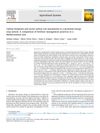 1 citations,
November 2020 in “Journal of The American Academy of Dermatology”
1 citations,
November 2020 in “Journal of The American Academy of Dermatology” Low input with cover crop optimizes yield and reduces greenhouse gas emissions.
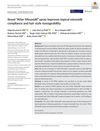 1 citations,
August 2020 in “Journal of Cosmetic Dermatology”
1 citations,
August 2020 in “Journal of Cosmetic Dermatology” The "After Minoxidil" spray makes hair easier to style, less greasy, and encourages people to keep using the treatment.
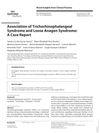 1 citations,
January 2020 in “Skin appendage disorders”
1 citations,
January 2020 in “Skin appendage disorders” A family was found with both Trichorhinophalangeal syndrome and Loose Anagen Syndrome, suggesting a genetic connection.
 1 citations,
October 2017 in “The Journal of Urology”
1 citations,
October 2017 in “The Journal of Urology” Long-term medication for enlarged prostate might not clearly affect the timing or outcomes of later surgery.
 1 citations,
May 2017 in “Asian journal of medical sciences”
1 citations,
May 2017 in “Asian journal of medical sciences” The dietary supplement significantly improved skin, nails, and hair in older adults.
 1 citations,
April 2017 in “Journal of Investigative Dermatology”
1 citations,
April 2017 in “Journal of Investigative Dermatology” D-OCT shows increased blood vessel growth in response to tissue damage in Frontal Fibrosing Alopecia and is useful for diagnosis and monitoring.
 1 citations,
December 2016
1 citations,
December 2016 Researchers created a model to understand heart aging, highlighting key genes and pathways, and suggesting miR-208a as a potential heart attack biomarker.
 1 citations,
July 2016 in “Cosmetics”
1 citations,
July 2016 in “Cosmetics” Black henna tattoos can cause severe allergies to hair and textile dyes, and there's a need for greater public awareness and regulation.
 1 citations,
January 2015 in “Advanced techniques in biology & medicine”
1 citations,
January 2015 in “Advanced techniques in biology & medicine” Down Syndrome patients with Alopecia Areata often have hypothyroidism and specific immune abnormalities.
 1 citations,
May 2014 in “European Journal of Inflammation”
1 citations,
May 2014 in “European Journal of Inflammation” A lotion with minoxidil, hydrocortisone butyrate, and 17a-estradiol can improve or stabilize Frontal Fibrosing Alopecia in some cases, but there's no universally-accepted treatment yet.
 1 citations,
March 2014 in “Senses and Sciences”
1 citations,
March 2014 in “Senses and Sciences” A supplement with Serenoa repens improved hair loss in a patient.
 1 citations,
November 2011 in “Open access journal of contraception”
1 citations,
November 2011 in “Open access journal of contraception” Birth control pills with low-dose estrogen and antiandrogenic progestins can effectively treat acne.
 1 citations,
January 2009 in “Actas Dermo-Sifiliográficas”
1 citations,
January 2009 in “Actas Dermo-Sifiliográficas” Docetaxel, a chemotherapy drug, was reported to cause psoriasis in a patient for the first time.
 1 citations,
February 2004
1 citations,
February 2004 Skin diseases are common and can significantly affect people's lives; better outcome measures and ethical clinical trials are needed to improve dermatology care.
 1 citations,
January 2003 in “Dermatology”
1 citations,
January 2003 in “Dermatology” Finasteride's effectiveness measured by observing hair cortex changes using a cheap and easy method.
 1 citations,
January 2002 in “European Urology Supplements”
1 citations,
January 2002 in “European Urology Supplements” Tamsulosin works faster, but both drugs have similar effects after 6 months.
 1 citations,
May 1999 in “Journal of The European Academy of Dermatology and Venereology”
1 citations,
May 1999 in “Journal of The European Academy of Dermatology and Venereology” Treat hair loss with medicine, continue indefinitely.
 February 2009 in “International Journal of Dermatology”
February 2009 in “International Journal of Dermatology” New dermatology leaders and events were announced.
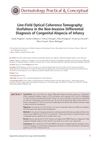 July 2024 in “Dermatology Practical & Conceptual”
July 2024 in “Dermatology Practical & Conceptual” LC-OCT helps accurately diagnose different types of infant hair loss without invasive methods.

The combined treatment increased hair density in most patients with Androgenetic Alopecia.
 March 2024 in “bioRxiv (Cold Spring Harbor Laboratory)”
March 2024 in “bioRxiv (Cold Spring Harbor Laboratory)” Minoxidil treatment improves heart defects in a DiGeorge syndrome model.
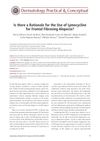 January 2024 in “Dermatology practical & conceptual”
January 2024 in “Dermatology practical & conceptual” Lymecycline may help with Frontal Fibrosing Alopecia but needs more research.
 January 2024 in “La Ciencia al Servicio de la Salud y Nutrición”
January 2024 in “La Ciencia al Servicio de la Salud y Nutrición” Spironolactone is effective and safe for treating hair loss, excessive hair growth, and acne.
 January 2024 in “Polski Merkuriusz Lekarski”
January 2024 in “Polski Merkuriusz Lekarski” Pica disorder in central Iraq is mainly found in females and is linked to low iron levels; treatment with iron improves most patients.






























